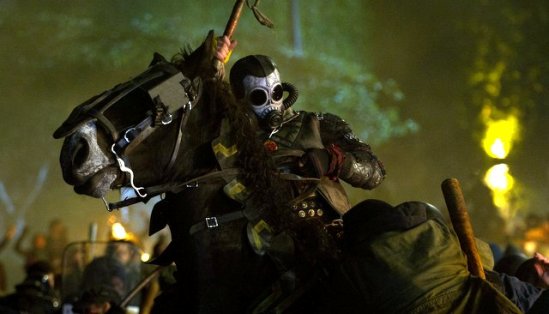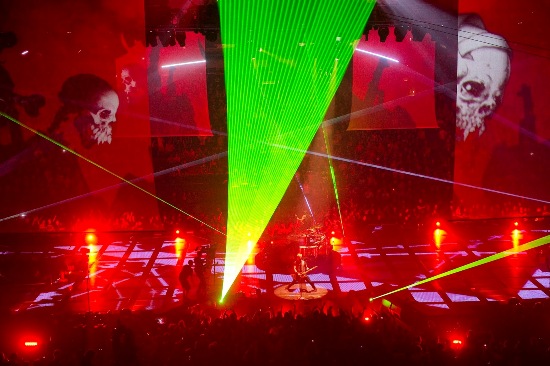A decade on since Some Kind Of Monster – documenting the rock gods’ sloppy attempt to once again reach ‘full heaviosity’ on St. Anger –Metallica are back on the big screen. Much like Death Magnetic, Through the Never tries to squeeze something new out of the old pieces that made up Metallica’s late-80s high-watermark. Exchanging the Spinal Tap-esque candidness of Some Kind Of Monster for a Pink Floydian re-framing of classic material into a more ‘cinematic’ work, Through the Never is a unique blend of concert movie and disjointed apocalyptic fiction. The result is pretty unlike anything that came before – save perhaps The Song Remains The Same. It’s a bombastic, gigantic, 3D Imax ‘experience’ masquerading as a film, and the absurd grandiosity of the whole thing is by far its greatest strength.
Though this is Metallica’s ship, Nimród Antal is at the helm and the Hungarian-American director handles the task of bringing Metallica to the big screen with much of the same questionable surrealism and gusto that characterized his Predator reboot. Dane DeHaan (the weedy antagonist from Chronicle) stars as Trip, a mute skater kid moonlighting as a Metallica roadie who quickly gets called off on band business barely halfway through opening number, Creeping Death, effectively splitting the movie’s focus in two. Cue suspension of disbelief.
Charged with picking up an undisclosed item from a van “somewhere in town”, Trip’s trip outside the arena quickly descends from mysterious suspense to downright madness, mirroring the controlled chaos of the Metallica arena gig. The streets outside are initially filled with warring crowds rioting aimlessly and vigorously against authority. Eventually, the disarray shifts to indiscriminate violence and anarchy, centred on Trip’s fleeing a hammer wielding, Lord Humungus-like horseman. It’s pretty ridiculous, but it’s Metallica.
The most consistent theme in Metallica’s music has always been the abuse of power, prevalence of injustice, and loss of control – and the fiction here fits in with this. And if Antal’s a little heavy handed with metaphor, well, so are Metallica. For Whom the Bell Tolls – surely the ultimate musical war cry for the underdog soldier? – strikes up just as the unlikely hero rides out to meet his foes. Get it? Master of Puppets soundtracks his struggles with authority with just about the same level of subtlety, the imagery even going as far as breathing laughable life in to a formerly inanimate puppet. The whole thing vicariously treads that thin line between the ridiculous and sublime. The soundtrack goes a long way in veering things towards the latter, yet the former is well and truly present throughout.

Besides all this, the fictional elements are a mere sideshow, arguably needlessly fleshing out the already pretty thrilling spectacle of a full-blown Metallica gig. Fundamentally, this is just a concert movie. The setlist plays like a ‘Best Of’ with a handful of curveballs thrown in (which repeatedly serve up convenient opportunities to check out what Trip’s up to outside without missing ‘the good bits’ back at the gig). Only a couple of post-black Album tunes feature, and in terms of running time they’re mostly negligible. As evidenced by Some Kind of Monster, and indeed Lulu, Metallica clearly ain’t clever dudes, but they can still make some of the greatest noise of all time. The incessant crane shots and the band’s ceaseless in-the-round energy make it less visually monotonous than your average on-screen arena show can be, and then they hit the kill switch, and whip out either the giant electric chair for Ride the Lightning (impressive as it is, it still feels somewhat laughably like Stonehenge), the sea of mist and crucifixes for Master of Puppets, or the giant collapsing Lady Justice for …And Justice for All.
It’s loud, it’s fun, it’s epic – it’s Metallica. A stubbornly hair-metal barnetted Kirk Hammett still shreds like it’s 1983, Lars Ulrich still pounds away like an overexcited toddler, and James Hetfield’s satanic trucker drawl remains intact. It’s unclear if even they know precisely why the fictional scenes were included, but they don’t harm the movie, and they arguably make the feature length running time more palatable. The film’s climax is definitely accented and improved by the fiction – becoming something slightly more than your average concert film – and it even brings into question the irony one feels when confronted by any form of rebellious music in a stadium setting. All punks will ultimately eat their words and sell their stories for millions. Do these guys even know what the music’s about any more? Do they even care? Why did they make this film? Well if you’re a Metallica fan, it’s a damn sight cheaper than going to see them live. Lars still gets his millions, and you still get to see Master of Puppets in all of its unspoiled brilliance. Through the Never isn’t trying to change the narrative like St. Anger & Lulu both failed to do, and for that we should be truly thankful.



